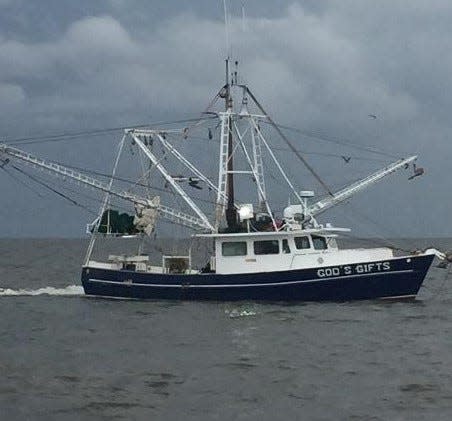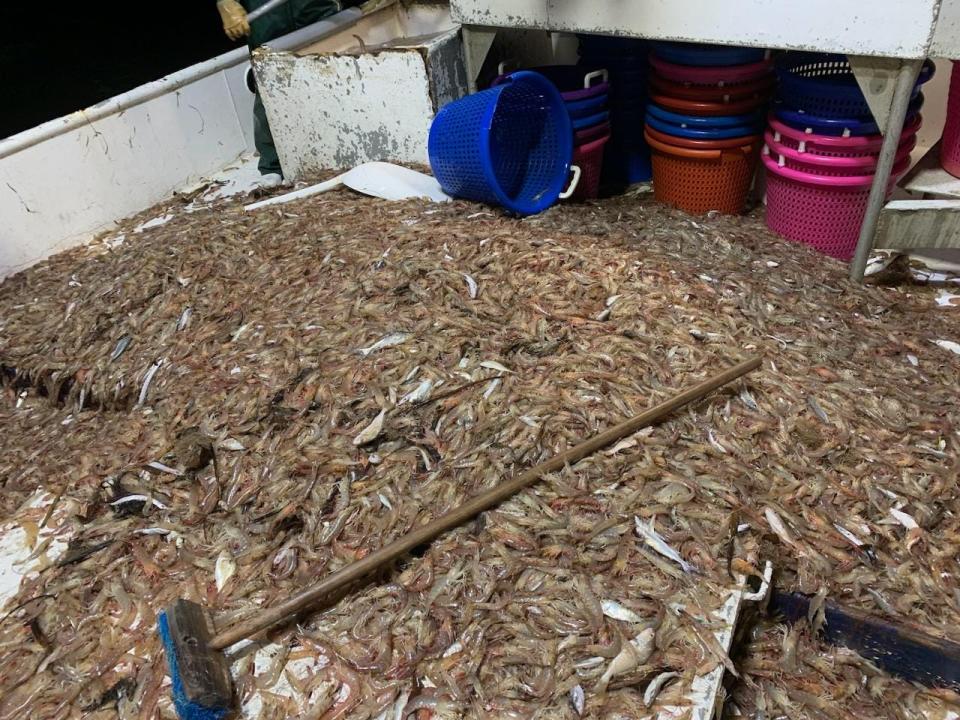Louisiana shrimpers forced to gamble their livelihood to stay in the industry
This article has been updated for clarity.
Craig Theriot looks out at the Gulf of Mexico as his boat is fueled up. It's the waters he's worked his entire life. If anything breaks in the next 10 days, he'll never be able to work her waters again.
"I'm leaving tomorrow. I don't make much money, but it's a check," Theriot said Feb. 27. "Hopefully we don't have a breakdown, 'cuz if we get a breakdown, I'm done. You can put me on the shelf."
Theroit's story is shared by many shrimpers this year. The state's inshore shrimp season won't start until officials choose a date, usually in early May. But shrimpers with large enough boats can shrimp outside the state's three mile limit at any time of the year. Theroit's savings have all but depleted because it's simply not profitable to go out shrimping right now. Prices are the lowest they've ever been and are driving many shrimpers and processors in the Lafourche and Terrebonne area out of the industry. Business leaders say it's imports being illegally dumped on the market that are driving the prices down, and although there are tariffs imposed on the imports, it's not enough.
This year, many shrimpers just aren't fishing, and it all comes down to overhead. Theriot's is at least $6,600. During his last trip out, he sold 170 boxes of shrimp − 17,000 pounds − and he made $3,000. The market for shrimp has tanked. A pound of small shrimp, for instance, is selling for $.35 to $.40. On a normal year, they would sell for at least double that: $.85.
Theriot tallied up his overhead: fuel is $4,700, for 1,400 gallons; it's about $1,500 for ice, and about $400 to $500 for groceries for two.
"That's before I make a dime," Theriot said.

Theriot became a deckhand at 17, but he said he has been on the boat with his father since he was in diapers. The sense of freedom of the open water, the algae-like smell that hangs in the air, the beauty of a rising sun witnessed from the deck of his 55-foot boat, God's Gifts, he said there's just nothing like it.
Shrimping is in his blood, Theriot said. So tied to the Gulf's waters, even while he was taking time off, waiting and hoping for prices to bounce back, Theriot couldn't go for long without the water's briny kiss.
"My wife and I would go ride down to the end of the road in Cocodrie just so I could smell the water, 'cuz I ain't been on it in a while," he said. "I've seen more sunsets and sunrises than most people are going to see in their lifetime. It's beautiful, man. Lookin' out your office window, you can't ask for a prettier picture."
The life and work that he loves is in jeopardy, more now than any other year. Boats are being sold, and processors are closing their doors, all because of the record low prices. Imports are driving the American shrimper out of the market, and Theriot doesn't want to give it up waiting and watching his savings dwindle. He'd rather go out working.
"I love to do my job, and I'm good at it," he said. "It's freedom, bruh. I get to work for myself. Out there on the water, I mean you can't ask for a better living. It's hard work, but everybody's got to work.… I couldn't do much else at my age. I'm fixin' to be 59-years-old."

Before captains leave, Theriot and other shrimpers have to make a prediction: do they think they will catch enough shrimp to exceed their cost to do business? If the profit margins aren't enough, they don't risk it, because unforeseen expenses like equipment failure can easily turn the entire trip into a loss.
More: Residents say the Chauvin, Montegut, and Bourg communities are being uprooted
More: Former pro basketball player from Houma creates low-cost off-season league
More: Legislature approves $26M in spending during crime session. Here’s where the money’s going
In a normal year, Theriot would have made enough during the season to coast on his savings and make repairs to his boat in preparation for the next season. But this off-season, he said he has no choice but to go back out. He is the breadwinner of the family, and the season was so bad he didn't make enough to wait.
It's not any better on the processors' side.
Faith Family Shrimp Co.'s Angela Portier said processors are struggling as well. Faith Family Shrimp Co. can have up to five employees, but it currently has only one. She said it's partly due to it being off-season, but it's also because prices are just that bad. The company hasn't lost any wholesalers who buy its shrimp, but buyers are limited on how much they can purchase.
The reason, business leaders say, is because of the imports. Figures provided by the Southern Shrimp Alliance show the three major importers into the United States are India, Ecuador and Indonesia. India accounts for 40%, Ecuador 25% and Indonesia 18%.
While mechanisms are in place to recoup money for the damages of practices like illegal dumping, they are all retroactive. It can take up to a decade before local businesses and captains ever see any relief for the damage done, and by that point, they say it's too late.
Processors' fates are linked with the shrimpers, Portier said. If shrimpers pull out of the business, processors have no product.
"We're losing fishermen," Portier said. "When you lose fishermen, you lose pounds. So then you don't have the volume coming in and you need the volume to keep your facilities going. You've gotta have the product, and we're not going to have the product if the industry keeps declining."
This article originally appeared on The Courier: Louisiana shrimpers gamble their livelihood battling imported shrimp

